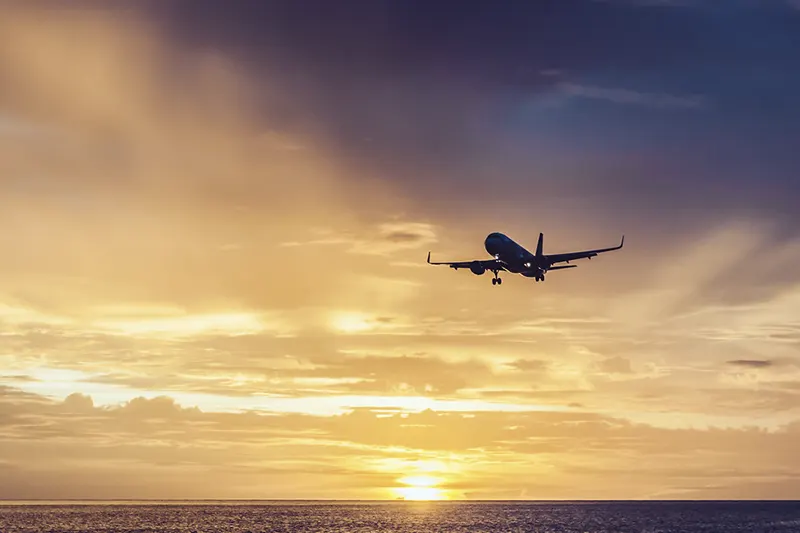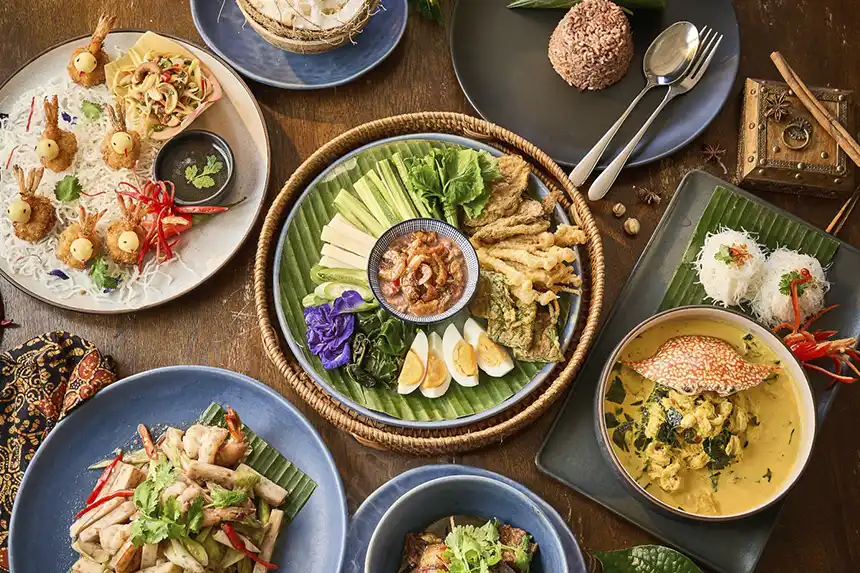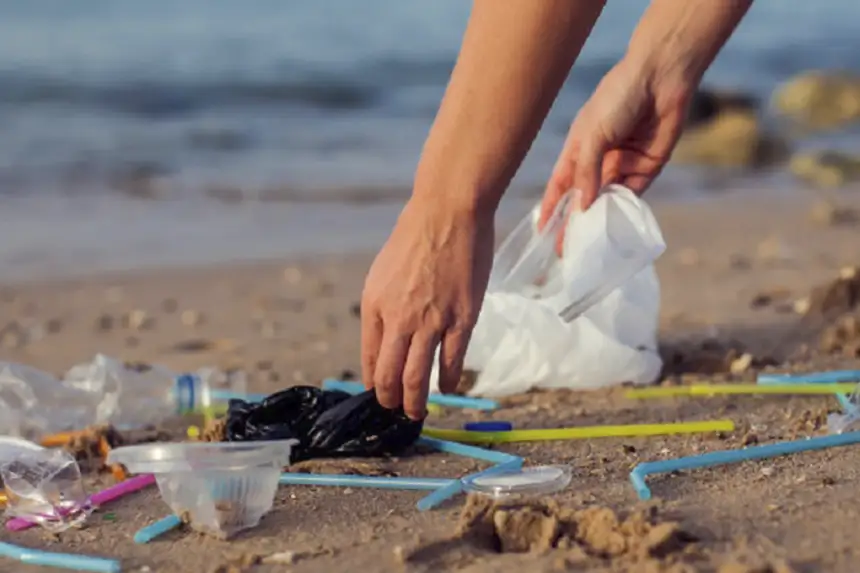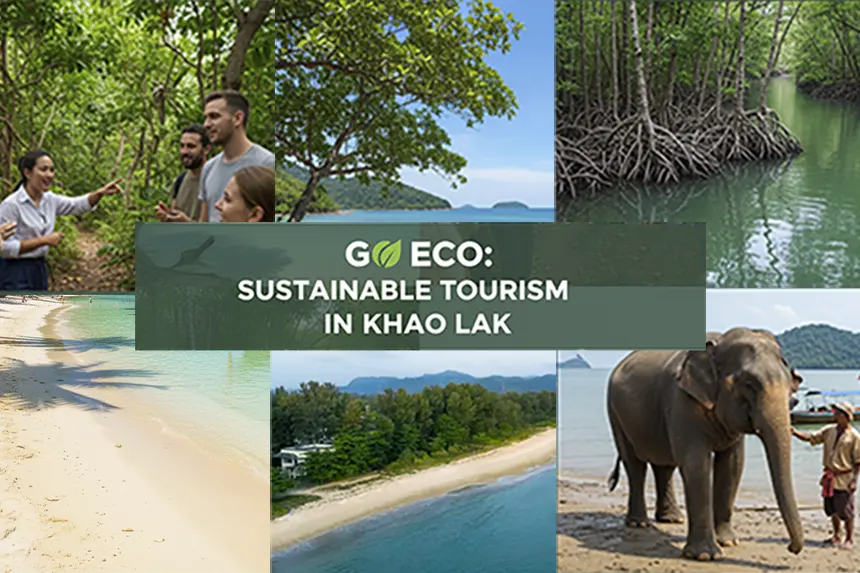Headed to Khao Lak? It’s a gorgeous coastal spot that just keeps getting popular. While tourism helps the local economy, the impacts on the environment and local culture are inevitable. So, how can we travel without harming the very things we came to see? The answer is sustainable tourism. It’s all about travelling consciously, minimising your footprint while having an incredible time and supporting the locals.
So, what’s the big deal with sustainable tourism?
You’ve probably heard of sustainable tourism, eco-tourism, and community-based tourism. They might sound a bit formal, but they’re all about the same thing: making sure our fun doesn’t hurt the place or the people who live here. The main focus is on the preservation of natural habitats, such as marine ecosystems, mangrove forests, and diverse wildlife, while also promoting culture and local economic development.
Here’s the breakdown.
- Sustainable tourism is a wider idea. It means making choices that are good for the environment and the community in the long run.
- Eco-tourism is a bit like “green” tourism. It’s about visiting natural places in a way that helps protect them and gives back to the local folks.
- Community-based tourism (or CBT) is when locals run the show. They create the tours and welcome visitors, so the money you spend goes right back into the community.
Why Sustainable Tourism Matters in Khao Lak
Khao Lak is home to a beautiful coastline and the lush national parks filled with wildlife. But as more people fall in love with this place, we need to be more mindful of how we visit. Here are the reasons why we should practice sustainable tourism in Khao Lak so that this little paradise stays healthy for a long time.
- The coast: Things like plastic pollution, irresponsible waste disposal, and even driving on the sand can damage fragile dune ecosystems and harm marine animals like nesting sea turtles. It’s best to keep the water clear and the ecosystems calm!
- Forests: As more hotels are built, important forests and animal habitats, like our vital mangrove swamps, can shrink. Mangrove forests are crucial because they act as a natural barrier against storms and tsunamis, and they are a nursery for many kinds of fish and crabs. When they’re cleared for development, it affects both the environment and the local fishing communities.
- Wildlife: Wildlife is a significant part of what makes Khao Lak special. Unregulated tours, especially those using noisy vehicles like ATVs, can disrupt animals and cause them to leave their natural habitats. It’s important to choose operators that prioritise observing animals from a safe distance, allowing them to live without stress.
A Green Traveller and How to be one 🌱
You don’t have to be a superhero to help out. Small actions can make a big difference!
1. Aware
Keep eco-tourism in mind for all the small things you do. Your awareness is a significant step.
2. Choose Green
Eco-friendly Flights

Even before you land, you can start being a green traveller. A plane uses a lot of fuel during takeoff and landing, so choosing a direct, non-stop flight can significantly cut down on emissions. Also, try to pack light, as a lighter plane burns less fuel. Finally, consider flying economy class, as business and first-class seats take up more space and have a larger carbon footprint per person.
Eco-conscious resorts
When booking your stay, look for places that have a clear commitment to sustainability. Many eco-friendly resorts are designed to blend with nature using local materials and minimising their footprint. Ask if they use renewable energy, have a recycling plan, or support local staff and communities. A guesthouse run by a local family is also a great way to ensure your money stays in the community.
- The Sarojin: A leader in luxury and eco-conscious design, this resort has a formal “Sarojin Cares” initiative, which includes a Community Fund, a “One Booking One Tree” reforestation program, and an on-site bottling plant to eliminate single-use plastic. Book here.
- Khaolak Merlin Resort: This eco-resort is known for its biodiversity and conservation efforts, including a comprehensive plan for energy and water efficiency, and a dedicated program for protecting the local slow loris population. Book here.
- Apsara Beachfront Resort and Villa: Committed to sustainable hospitality through its “Apsara Care” program, this resort has implemented plastic-free practices and is involved in mangrove restoration and sea turtle conservation. Book here.
- Devasom Khao Lak Beach Resort & Villas: Recognised with a Responsible Thailand Award, this resort is a leader in community commitment and responsible tourism, emphasising support for the local people. Book here.
- JW Marriott Khao Lak Resort & Spa: This resort features an innovative “JW Garden” where food waste is upcycled into fertiliser for the on-site farm, which supplies its restaurants. Book here.
- La Flora Khao Lak: This resort uses sustainable materials and focuses on minimising its environmental impact through energy conservation and waste reduction programs. Book here.
- Pullman Khao Lak Resort: Holding a Green Globe Certification, this hotel meets a globally recognised standard for sustainability, with an ongoing commitment to improving its environmental and social performance. Book here.
Green Restaurants

Look for restaurants that use fresh, local, and seasonal ingredients. This supports local farmers, reduces the carbon footprint from transporting food, and lets you experience authentic Thai cuisine. They also might have zero-waste practices, like composting food scraps and using every part of an ingredient. By choosing places like this, you can support businesses that are actively working to minimise their environmental impact.
- Takola Thai Restaurant at the Devasom Khao Lak Beach Resort is a great example. It has been recognised by the Michelin Guide for using fresh ingredients sourced from local communities and fishermen
- Drift Beach Bar & Grill: As part of the JW Marriott Khao Lak Resort, this restaurant offers a “farm-to-table” experience. It uses fresh, seasonal produce from the on-site JW Garden.
- Burmese Corner contributes to sustainable tourism in Khao Lak by showcasing authentic Burmese culture through its cuisine, offering vegetarian and vegan dishes that promote more sustainable dining.
- Markets: Don’t overlook the local markets and street food stalls! They are a fantastic option that supports the local community directly.
Ethical Activities
Book ethical tours. Look for operators who care about animals and the environment. They will often have a clear policy on their website about ethical practices. Eco-friendly activities are low-impact, educational, and beneficial to the community. Here are some great examples:
- Wildlife Watching: Instead of supporting activities with captive animals, choose passive observation of local wildlife in their natural habitat. For instance, book a responsible tour to observe rescued elephants at a sanctuary like Khaolak Elephant Sanctuary instead of riding them, which is a harmful practice.
- Exploration: Explore the area with low-impact activities which offer a quiet, intimate way to experience ecosystems. You can go hiking or trekking (instead of ATVs or bikes) in Khao Lak-Lam Ru National Park or Khao Sok National Park, which is known for its ancient rainforest. For water activities, a kayaking tour through the mangrove forests of the Little Amazon is a fantastic, pollution-free option.
- Support Local Communities: Book tours led by local guides that focus on educating visitors about the history, traditions, and customs of the community. This ensures your money goes directly to the people who live and work in the area. Visiting the Tsunami Museums is a good example.
- Volunteer: You can also get involved in local conservation activities. Look for opportunities to participate in a beach cleanup or visit the Sea Turtle Conservation Centre to learn about their projects and support their work.
3. Reduce Your Footprint
- Don’t take shells from the beach: You might think taking one shell won’t make a difference. So do the other thousand visitors. Those beautiful shells you see on the beach are more than just a souvenir. They are a vital part of the local ecosystem, providing homes for hermit crabs and other marine life. Shells also break down over time to form the very sand that makes up the beach, so removing them can contribute to erosion.
- Don’t buy souvenirs made from protected animals: By refusing to buy items made from shells, coral, or other animal products, you are directly helping to protect endangered species and their ecosystems.
- Say no to single-use plastics: Many foods in Thailand come with individual packaging, and the responsibility to say no to it falls on you. You can help by carrying a reusable water bottle and a shopping bag. Many shops and cafes will happily refill your bottle, and you can even bring your own reusable straws or cutlery to cut down on waste.
- Help with waste management: You can assist local efforts by separating your trash into recyclables, biodegradables, and non-recyclables. If your accommodation doesn’t have a clear system, you can ask where to dispose of your trash responsibly.
- Be mindful of water and energy: Even though you might want to appreciate the luxury during your trip, simple things like turning off lights and saving water when not in use or reusing towels in your hotel can help.
- Always be respectful of local customs and traditions: This is key to sustainable travel. Dress modestly when visiting temples and remember to remove your shoes. A simple “hello” (sawadee) in Thai will be greatly appreciated by the locals.
Get to know the Green Team
A lot of different groups are working together to keep Khao Lak beautiful. It’s a real team effort!
Local conservation groups & non-profits
These are the community heroes. They work on the ground to make sure tourism is good for their villages and traditions.
- The Sustainable Khao Lak Network: This is a collaborative Facebook-based group where you can connect with locals and visitors to find and support green businesses and participate in conservation efforts.
- Foundation for Education and Development (FED): This NGO is dedicated to the Myanmar migrant community in Khao Lak with a focus on education, health, and migrants’ rights. They are also involved in environmental projects like beach cleanups and mangrove planting.
- Baan Tha Din Daeng Community Tourism Project: This is a community-led project that focuses on mangrove planting and seagrass restoration in Baan Tha Din Daeng village, which you can support by booking a community-based tour.
Social Enterprises & Tour Operators
Many operators are committed to ethical and sustainable practices.
- Khao Lak Planner is a local tour operator that specializes in small-group tours, supporting the community while guaranteeing environmental and ethical responsibility, including a strict “No Riding” policy for elephant activities.
- Discovery Travel: An eco-conscious tour operator facilitates “plastic-free tours” by supplying guests with reusable water bottles and working to eliminate single-use plastics from their trips. This operator also provides information and participates in community projects.
- Khao Lak Explorer: A dive centre is part of the Marine Conservation Thailand Project, which works to protect local reefs and promote sustainable dive tourism.
- Andaman Discoveries: This social enterprise, based in Kuraburi, offers award-winning community-based tours and volunteer projects that directly support local villages, promote cultural preservation, and help fund projects like reforestation.
- Khaolak Elephant Sanctuary: This sanctuary provides a haven for rescued elephants and offers ethical, observation-led experiences that support animal welfare and local communities. It has been recognised with a Responsible Tourism Award for offering observation-only programs instead of riding or bathing the elephants. The sanctuary also works with local farmers to source food for the animals.
Government & International Support
- The Tourism Authority of Thailand (TAT) are creating rules to protect the environment and promote responsible travel through its “Amazing Thailand” campaign.
- Phang Nga Tourism Association: This organisation works with local government and private businesses to develop tourism in the province. They are involved in promoting nature-based activities and building a more sustainable tourism framework for the future.
- International Support: Global groups provide funding and expertise to help local projects succeed. For instance, the TUI Care Foundation has supported the TUI Academy Thailand project in the Phang Nga region, which provides vocational training to at-risk youth to protect them from exploitation in the tourism industry.
Voluntourism in Khao Lak

Voluntourism is an incredible way to go beyond just visiting a place. It’s about giving back for its well-being. It’s a chance to meet local people, learn new skills, and make a real, hands-on difference to a community or the environment.
Here are a few ways you can get involved:
- Join a Beach Cleanup: You don’t need a special tour to help out. It’s a simple, effective way to help keep the coastline beautiful and meet like-minded people. Get in touch with The Sustainable Khao Lak Network at their Facebook page for the latest beach clean-up schedule.
- Volunteer at Local NGOs: Many local non-profits welcome volunteers. It’s best to contact them directly about specific needs and opportunities.
- Foundation for Education and Development (FED): This is a highly active and important NGO that supports the Myanmar migrant community in the Phang Nga region. FED provides essential services like education, healthcare, and they are also involved in environmental projects. 📧: fedgrassroots.org | 📞: +66 76-679-574 |📍: https://maps.app.goo.gl/rT9cncVGe2BaawJJA
- The New Light Foundation CDC: This foundation is a non-profit organization that runs a community development center in the Ban Namkhem village. They offer various programs in education, health, and skill development, and they actively welcome international volunteers. 📧: cdcnewlight.org | 📞: +66 98-747-3775 |📍: https://maps.app.goo.gl/rT9cncVGe2BaawJJA
- Support Community Projects: Many local communities welcome volunteers for a variety of projects. For instance, the Baan Tha Din Daeng Community Tourism Project offers opportunities to help with their mangrove planting initiatives. If you have experience in teaching English to the youths, you can contact Burmese Corner to volunteer there.
- Contribute to Conservation: If you’re a diver or snorkeler, ask the local dive shops or operators how to help with marine conservation projects, such as coral reef monitoring or restoration.
- Go through a Social Enterprise: Organisations like Andaman Discoveries specialise in connecting travellers with local communities for meaningful projects. They offer everything from short-term village stays to longer-term volunteer placements that focus on community development, cultural exchange, and conservation.
Stay Informed
- The Tourism Authority of Thailand (TAT): They’re the official source for travel info and can point you toward sustainable options.
- Local Tour Operators: Companies like Khao Lak Explorer and Discovery Travel are known for their sustainable participation.
- The Sustainable Khao Lak Network: Reach out to their Facebook page to grab information on recent conservation activities.
- Hotel Websites: Many hotels have sections on their websites that talk about their community and environmental work.
- Travel Websites: Websites like EcoHotels.com, GreenKey or Sustainable Travel International provide lists of certified eco-friendly accommodations globally, and you can often filter for specific regions.
- TripAdvisor: You can search for “eco-friendly” or “sustainable” in the filters when searching for resorts or restaurants in Khao Lak. Customer reviews often mention sustainability practices.
Final Words
Putting this guide together and researching every detail certainly brought a new level of awareness. We truly hope this information stays with you, inspiring a greener, more mindful approach to every beautiful place you visit, not just Khao Lak.























 and
and 



